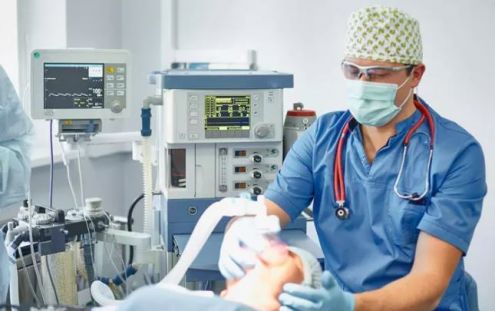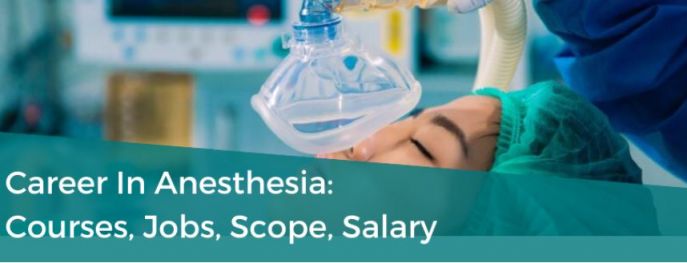Want to know How to become Anesthesiologist ? Well you have landed on the right article
It is an anaesthetist's responsibility to administer anaesthesia during the procedure and monitor vital signs in the patient throughout the procedure, which plays a vital role in the surgery process.
For someone to have a career in this field, they will need specialised training and education. This profession is a medical profession that might be of interest to you if you have any interest in medicine.
Presented in this article is information on how to become an anesthesiologist, what a physician anaesthetist does, and what they earn on a monthly basis.
Who is an Anesthesiologist?
Anaesthetists are treating medical professionals who specialise in anesthesiology, a medical field with a wide variety of related careers.
During various medical procedures and surgeries, these medical professionals use anaesthesia on patients that requires them to be sedated before, during, and after the surgical procedure.
In anaesthesia, the anaesthetist uses a variety of substances, ranging from mild numbing agents to general anaesthesia, depending on the treatment.
Surgical technologists and nurses work as a team with doctors, surgeons, and other medical professionals to provide patient care.
What does an Anesthesiologist Doctor do?

There is a large responsibility on the part of anaesthetists to keep their patient safe and monitor them all throughout surgery, as well as afterward.
Every step of the process plays a vital role in the success of the surgery and the health of the patient. Here are just a few of the tasks they complete during the various stages of surgery:
Before surgery
Before surgery, an anaesthetist prepares patients for anaesthesia and ensures that they are able to handle the procedure. You can ask anaesthetic doctors any questions you may have about the anaesthesia process during your medical procedures.
Anaesthesia doctors review your medical history extensively and answer any questions you may have. Then, your vital signs will be monitored and anaesthesia will be administered.
During surgery
During the entire surgery, an anaesthesia doctor monitors the patient to control pain and keep any vital signs under control.
Patients with chronic medical conditions such as asthma or diabetes may also be treated by them. During a medical procedure, if a problem arises, the doctor oversees its monitoring and resolution.
After surgery
The anaesthetist assesses the patient's recovery following surgery as soon as it is complete. When a patient is ready to go home or move to a new part of the hospital, the physician monitors the patient's recovery from anaesthesia.
A pain management plan can also be developed by them after a patient has been discharged from the hospital.
How To Become Anesthesiologist

You might want to consider these steps if you are interested in pursuing this career path:
Get a medical degree after passing the 10+2 examination
Anesthesiology is one of the fields of medicine that requires a high level of education that includes physics, chemistry and biology as compulsory subjects. To enter the field, one must first complete their higher secondary education (10+2) in the science stream.
This entrance test, which is commonly used to test eligibility to sit for the National Eligibility Completion Medical Entrance Test, is conducted by the Central Board Of Secondary Education.
If you clear the NEET, you are eligible to pursue a Bachelor of Science in Medicine (BScN) degree at a medical college.
Obtain a medical degree
An anaesthetist must graduate from an MBBS program. Five-and-a-half years, plus an internship year, is the length of the course. During your MBBS programme,
you will learn about anaesthesia technology, anaesthesia techniques in the operating room, as well as anaesthesia technology. If you are interested in pursuing further education, then earning your Bachelor of Medicine and Bachelor of Surgery (MBBS) is a great place to start.
Continue your medical education
A post-graduate program in anaesthesia is possible once you have completed an MBBS. Anaesthesia post-graduate course admission is through the NEET-PG medical entrance examination, which is the National Eligibility Entrance Test (Postgraduate).
A minimum score of 50% in MBBS may also be required by some colleges. During your post-graduation, you will gain practical experience by performing anaesthesia procedures on real patients and learning how to monitor their condition.
An additional medical education allows you to focus solely on anesthesiology, even if your undergraduate degree covered general medicine or science subjects. With this specialty, you are capable of providing care in many medical fields.
Participate in a residency program
Start working as an anaesthetist in a residency program after you have completed all the required schooling. Residencies provide you with valuable on-the-job training and skills.
You will gain an understanding of the type of care you wish to provide throughout your career through this experience.
Select a specialisation
You might specialise in a particular population or type of anaesthesia as part of your residency program. There are options to continue your education, no matter whether you want to specialise in infant care or cardiac anaesthesia.
If you are interested in a specific skill set you can enrol in a training program at a hospital or clinic, or you can choose to start working without a specialty.
Anaesthesia doctors can work in a variety of other careers in addition to surgery. Some of these are:
Medical consultant: The Medical Consultant will be responsible for providing advice to small to medium healthcare organizations based on their experiences and the medical literature.
Nurse anaesthetist: Providing anesthesia and pain management to patients is the job of a nurse anesthetist.
Anaesthesia technician: A physician's assistant is an allied health worker who performs a patient care role primarily by administering and monitoring anesthesia.
Anesthesia technicians possess a wide range of experience with anesthesia techniques, instruments, supplies, and technologies.
Associate consultant: Associate Consultants tend to support the Senior Consultants or Consultants in the early stages of their careers.
Although the work of Associate Consultants may sometimes be complex and non-routine, they generally work under supervision.
Clinical associate: The clinical associate assists health care professionals during medical procedures by providing administrative and clerical support to medical facilities. They are also responsible for providing high-quality care services to patients.
Anesthesiologist assistant: When they are administering and monitoring the anesthesia during surgery, an anesthesiologist assistant will adjust or maintain the anesthetic level as necessary.
In addition to laboratory work and blood drawing, anesthesia assistants may assist with testing.
Anesthesiologist Qualification
It goes without saying that anaesthetists receive formal and informal training during their schooling and training for their job, but they must also develop certain skills to get their anesthesiologist degree.
Below are some of the fundamental skills needed to succeed in the role:
- Problem-solving
A key part of this role is being able to solve problems, since different patients have different needs. The type of anaesthesia to be used, the way it should be administered, and how much of it should be administered must be determined.
When monitoring and evaluating a patient's vital signs through the course of surgery, it is of the utmost importance that you can resolve a problem as soon as it arises.
- Knowledge of medical terminology
Having an understanding of medical terminology lets you work collaboratively with other doctors and nurses.
To properly answer the patient's questions and fully understand their needs, you need to know what certain terms mean. Depending on your specialty, you will need to learn certain terminology.
- Ability to check vital signs
As you progress through your education and work experience, you should learn how to keep track of the vital signs of a patient, as this is the primary method of monitoring a patient during surgery.
The way you evaluate a patient's vital signs should be tailored according to their individual needs. The signs to watch for are likely to be more specific for patients with a history of health problems. You are capable of handling a broad variety of cases with your vast knowledge of vital signs.
- Attention to detail
In this position, success depends on paying attention to every detail. It is necessary for you to be aware of both the large and small details involved in each and every stage of a surgical procedure.
It can be a challenging task to review a patient's medical history, administer anaesthesia or monitor patient recovery during a surgical procedure. However, your attention to detail when performing these tasks contributes to the overall success of the surgery.
- Ability to work under pressure
In order to be successful as an anaesthetist, one needs to be able to work under pressure. You may be able to determine the success or failure of a surgical procedure by making quick decisions during the course of the procedure.
You must complete your tasks in a safe manner and to the best of your ability, despite the pressure of the role, which leads to the need for this skill.

Salary Expectations as anesthesiologist
Rs. 11,55,449 is the average total compensation for an anesthesiologist with less than one year of experience. The average salary for an anesthesiologist in their early career is Rs. 11,99,878.
With 5-8 years of experience, a mid-career anesthesiologist earns an average total pay of Rs. 16,50,000. Rs. 23,42,196 is the average total compensation for a seasoned anesthesiologist with 10-19 years of experience.
Employees earning Rs. 18,55,000 or more in their late career.
Top Colleges Offering Anesthesiologist Courses In India
Anesthesiology
is being offered by a number of prestigious colleges and universities. A diploma, graduate, or post graduate degree is available in this field.
The following are some of the top colleges where you can study this subject:
- All India Institute of Medical Sciences, AIIMS
- Agartala Government Medical College
- Apollo Institute of Hospital Management and Applied Sciences, AIHMAS
- Aligarh Muslim University
- Srinivas College of Allied Health Sciences
- Amrita Institute of Medical Sciences and Research Centre
- Armed Forces College
- KPC Medical College and Hospital, Jadavpur
- IIMSR Lucknow - Integral Institute of Medical Sciences and Research
- St Johns Medical College, Bangalore
- Shree Guru Gobind Singh Tricentenary University, Gurgaon
- NMCH Sasaram - Narayan Medical College and Hospital
- School of Medical Sciences and Research, Greater Noida
- Smt NHL Municipal Medical College, Ahmedabad
- SGT Medical College Hospital and Research Institute, Gurgaon
What Is The Career Prospect Of An Anesthesiologist In India?
In a hospital setting, an anesthesiologist is considered to be an important part of all health-related work. There are many job opportunities that await you after you finish your degree in anesthesiology.
An anesthesiologist would be necessary as long as the patient is going to have surgery.
Anesthesiologists and anaesthetists have the opportunity to work in private clinics, hospitals, hospitals for the elderly, and children's hospitals, health care centres, medical colleges and universities, and even in schools and colleges.
In every surgery there is an anaesthesiologist who plays an important role. An anesthesiologist must be present in an operating room while surgery is being performed by a surgeon.
An allergic reaction can occur due to some medical interventions, which can lead to complications during the surgical procedure.
An anesthesiologist's main task during an operation involves monitoring the patient's heart rate, breathing, and blood pressure closely so that the surgeon can concentrate on completing the surgery as efficiently as possible.
If you were to complete your course, and have a chance to work as a volunteer at a health care center where you have the possibility to gain more experience, then that would be extremely beneficial.
You might be able to find a job as an anesthesiologist in India or another country with better salaries and perks due to the growing demand. Additionally, you could work with the military or research institutes.
If you have some experience in the field, and you would like to switch to a teaching position in medical colleges and universities, you can very easily apply for such a position.
Conclusion
In this case, let us assume that you wish to enter the field how to become an anesthesiologist. With the growing need for anesthesiologists throughout the country, if you meet those qualifications, you will have many job opportunities available to you.
In private medical facilities as well as in government-run facilities, you can work in these settings.Anesthesiologists earn a good living but they also have great responsibilities associated with their jobs.
There is a great deal of pressure to work under in this profession, and you will be required to work in various types of shifts. There is, of course, no greater satisfaction than to know that you are saving somebody's life by doing something you love.
I hope you liked our article on How to become Anesthesiologist , if you have any comments or suggestions do share them in the comments below
Frequently Asked Questions
Q1. What qualifications do I need to be an Anesthesiologist?
If a candidate wishes to pursue a career in anesthesiology, he/she will have to possess a solid foundation in the sciences, namely chemistry, physics, biology, and English.
They need to get an MBBS degree after they complete their tenth and second grade education. The postgraduate degree of MD in Anesthesiology, which is a course of two years after the MBBS degree, can be pursued after the MBBS.
Q2. Do Anesthesiologists earn well in India?
A typical anesthesiologist in India earns Rs. 967,325 per year as an average salary.
As opposed to this, the median annual income for an anesthesiologist in the United States is $343,000 (and can go up to $363,000 if bonuses are included), which translates to about Rs. 21,266,000 or 20 times higher than the average income in India.
Q3. How long does it take to be an anaesthetist?
An anesthesiologist is usually required to have at least 12 years of education in order to become licensed; at least four years of undergraduate studies, at least four years in medical school, and at least four years of training in a residency program, plus a year of fellowship training, or two years of independent practice.


